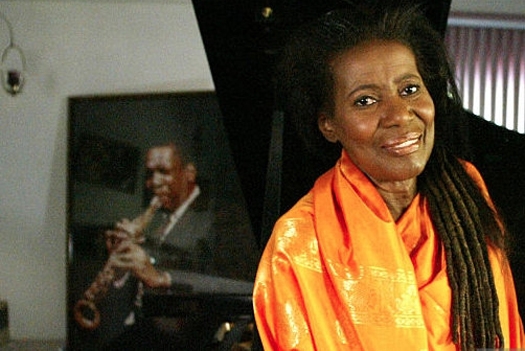27.08. – Happy Birthday !!! Being the replacement for the great pianist McCoy Tyner in anybody’s band would be a challenge guaranteed to invite the most ruthless scrutiny from jazz aficionados.
Being the replacement for Tyner in the late sax legend John Coltrane’s 1960s quartet – one of the most groundbreaking groups in jazz history – and being Coltrane’s wife into the bargain, magnifies the potential problem a hundredfold.
But the pianist, organist, harpist and composer Alice Coltrane, who has died of respiratory failure in Los Angeles aged 69, eventually emerged from that turmoil with nothing but widespread respect. About as far as could be imagined from the tambourine-playing rock-wife who ends up being smuggled on stage, she was a skilful modern jazz pianist, who had studied with bebop keyboard legend Bud Powell and worked in the company of such stars as saxophonists Johnny Griffin, Yusef Lateef and Lucky Thompson, guitarist Kenny Burrell and vibraphonist Terry Gibbs.
She joined her husband’s band at a time of climactic transition, when the saxophone visionary (increasingly drawn to Indian music and philosophies) was shifting his group’s emphasis still further away from orthodox jazz to an intense abstract music that was taking on the characteristics of a manic meditation. Tyner and the drummer Elvin Jones had finally drawn the line under how far they were prepared to abandon the jazz tradition.
Sympathetic to her husband both musically and spiritually, Alice was ready to go further. She developed an undulating, trancelike (and harplike) manner of keyboard playing to accompany his haunting soliloquies, exploring ambient and slow-moving textural ideas that would later seem like pioneering steps in New Age music. After Coltrane died of liver failure at 40 in 1967, Alice continued to explore the music of his final years, with Pharoah Sanders inheriting the saxophonist’s role.
Subsequently however, Alice converted to Hinduism and moved to more direct forms of religious engagement. She founded the Vedantic Center, a California-based spiritual commune, and became the swami of the San Fernando valley’s first Hindu temple, in Chatsworth. But she never lost sight of the unique importance of her husband’s legacy – telling this writer on the 20th anniversary of Coltrane’s death: “John wanted to go beyond all limitations in music, and if he had lived he’d still be doing it today. He always thought there was something else to do, something else to create.” Alice thus managed her husband’s archive, estate and musical legacy for four decades, taking care of his memory and occasionally playing memorial concerts with their saxophonist sons, Ravi and Oran.
Alice McLeod was born in Detroit. Her mother Anna sang and played piano in a Baptist church choir; her brother Ernie Farrow would become a bassist with Lateef and Gibbs. Alice began as a classical piano student at the age of seven, and church music provided much of her early inspiration. But she studied jazz piano in Paris in the 1950s, before returning to the US to work with Lateef, Burrell, Thompson, and eventually Gibbs, an effervescent swing player who had adapted his style to embrace bebop, klezmer music and more.
It was during a season at New York’s Birdland club with Gibbs in 1963 that the 26-year-old Alice met Coltrane, even then one of the most respected of jazz innovators. Gibbs was to tell the Los Angeles Times that the saxophonist “saw something in her that was beautiful”. Alice left Gibbs’s band to marry Coltrane, and two years later replaced the departing Tyner as the group began its radical swerve in a new direction.
Alice’s albums in the late 1960s and early 70s reflected the idiosyncratic conjunction of Middle Eastern and Indian religious world views she was considering. Though Ptah the El Daoud, from 1970, still retained a jazz line-up’s horn-sound (saxists Joe Henderson and Pharoah Sanders), subtle uses of flutes, the north African oud and the harp were suggesting new timbres, and Alice was increasingly attracted to unjazzy line-ups and non-western scales. Her performances became sparse, but she was always capable of musical surprises – a genuflection to Stravinsky’s Rite of Spring, and even a little Afro-Cuban music surface on 1975’s Eternity album.
She last performed in autumn 2006, on a short US tour with Ravi. The pair were due to perform in Britain this spring. Ravi and Oran survive her, as does her daughter Michelle and five grandchildren. Her son John Coltrane Jr died in a car accident in 1982.
Alice Coltrane, musician and religious teacher, born on 1937; died January 12 2007.







More Stories
Interview with Janis Siegel of The Manhattan Transfer: Jazz, being a more refined, interpreted form of music
CD review: George Benson – Dreams Do Come True: When George Benson Meets Robert Farnon – 2024: Video, CD cover
The band was tight as ever. The Warren Haynes Band cuts loose: Video, Photos